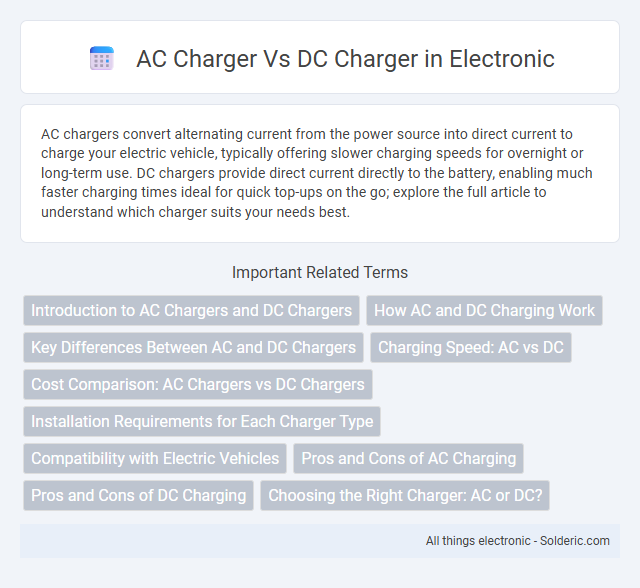AC chargers convert alternating current from the power source into direct current to charge your electric vehicle, typically offering slower charging speeds for overnight or long-term use. DC chargers provide direct current directly to the battery, enabling much faster charging times ideal for quick top-ups on the go; explore the full article to understand which charger suits your needs best.
Comparison Table
| Feature | AC Charger | DC Charger |
|---|---|---|
| Charging Type | Alternating Current (AC) | Direct Current (DC) |
| Charging Speed | Slower (Typically 3-22 kW) | Faster (Typically 50 kW to 350 kW) |
| Use Case | Home and workplace charging | Public fast charging stations |
| Charger Location | Often installed indoors or residential | Usually located at high-traffic public areas |
| Connector Types | Type 1, Type 2, Mennekes | CHAdeMO, CCS, Tesla Supercharger |
| Cost | Lower installation cost | Higher installation and infrastructure cost |
| Vehicle Compatibility | All electric vehicles support AC charging | Supports vehicles with DC fast charging capability |
| Power Conversion | Vehicle onboard charger converts AC to DC | Charger converts AC to DC externally |
Introduction to AC Chargers and DC Chargers
AC chargers convert alternating current from the power source into a suitable form for your electric vehicle, typically requiring onboard conversion to DC for battery charging. DC chargers supply direct current directly to the battery, enabling faster charging by bypassing the vehicle's internal converter. Understanding the difference between AC chargers, commonly used for home and workplace charging, and DC fast chargers essential for rapid public charging can help optimize your charging strategy.
How AC and DC Charging Work
AC chargers convert alternating current from the power grid into usable electricity that your electric vehicle's onboard charger then transforms into direct current to charge the battery. DC chargers bypass the onboard charger by delivering direct current straight to the battery, enabling much faster charging times. Understanding the difference between AC and DC charging helps optimize your electric vehicle's charging strategy based on speed and convenience.
Key Differences Between AC and DC Chargers
AC chargers convert alternating current from the grid into usable energy for your electric vehicle, typically delivering slower charging speeds suited for overnight or home use. DC chargers, known as fast chargers or rapid chargers, supply direct current directly to the vehicle's battery, enabling significantly quicker charging times ideal for long-distance travel or urgent power top-ups. Understanding the key differences between AC and DC chargers helps optimize your vehicle's charging efficiency based on your specific needs and location.
Charging Speed: AC vs DC
DC chargers provide significantly faster charging speeds than AC chargers due to their direct current delivery, which bypasses the vehicle's onboard converter limitations. AC chargers rely on the vehicle's onboard charger to convert alternating current to direct current, resulting in slower charging rates typically ranging from 3.7 kW to 22 kW. In contrast, DC fast chargers can deliver power levels from 50 kW up to 350 kW, enabling rapid battery replenishment in under 30 minutes for compatible electric vehicles.
Cost Comparison: AC Chargers vs DC Chargers
AC chargers typically have lower upfront costs and are more affordable for home installations, making them suitable for personal electric vehicle (EV) charging needs. DC chargers, especially fast chargers, involve higher installation expenses due to complex equipment and power requirements but offer significantly faster charging speeds ideal for commercial or public use. Your choice between AC and DC chargers depends largely on budget constraints and desired charging efficiency.
Installation Requirements for Each Charger Type
AC chargers require simpler installation with standard electrical outlets and minimal electrical upgrades, making them suitable for home use. DC chargers demand specialized infrastructure, including high-voltage power supply and cooling systems, which often necessitate professional installation at commercial or public charging stations. Understanding these installation requirements helps you choose the right charger based on location and available electrical capacity.
Compatibility with Electric Vehicles
AC chargers are widely compatible with most electric vehicles due to their standardized Type 1 and Type 2 connectors, making them suitable for home and public charging. DC chargers, also known as fast chargers, require specific connectors like CCS, CHAdeMO, or Tesla Supercharger plugs, which limits compatibility to vehicles designed to support these standards. The choice between AC and DC chargers depends on the electric vehicle model's charging port and onboard charging capabilities.
Pros and Cons of AC Charging
AC chargers offer widespread compatibility with most electric vehicles and are generally more affordable and easier to install compared to DC chargers. However, AC charging typically provides slower charging speeds due to lower power delivery, making it less ideal for rapid recharging needs. The reliance on the vehicle's onboard charger to convert AC to DC limits efficiency and can result in longer wait times during charging sessions.
Pros and Cons of DC Charging
DC chargers offer significantly faster charging speeds compared to AC chargers, making them ideal for long-distance travel and quick battery replenishment. However, DC chargers are typically more expensive to install and require more complex infrastructure, which can limit their availability in certain areas. The high power output can also generate more heat, necessitating advanced thermal management systems to protect the battery and ensure safety.
Choosing the Right Charger: AC or DC?
Choosing the right charger depends on your vehicle type and charging needs; AC chargers provide slower, steady energy ideal for overnight home charging, while DC chargers offer rapid power transfer suitable for quick top-ups during travel. Consider your daily driving distance and access to charging stations to determine whether an AC charger or a DC fast charger aligns better with your lifestyle. Your decision influences overall battery health, charging speed, and convenience.
AC charger vs DC charger Infographic

 solderic.com
solderic.com